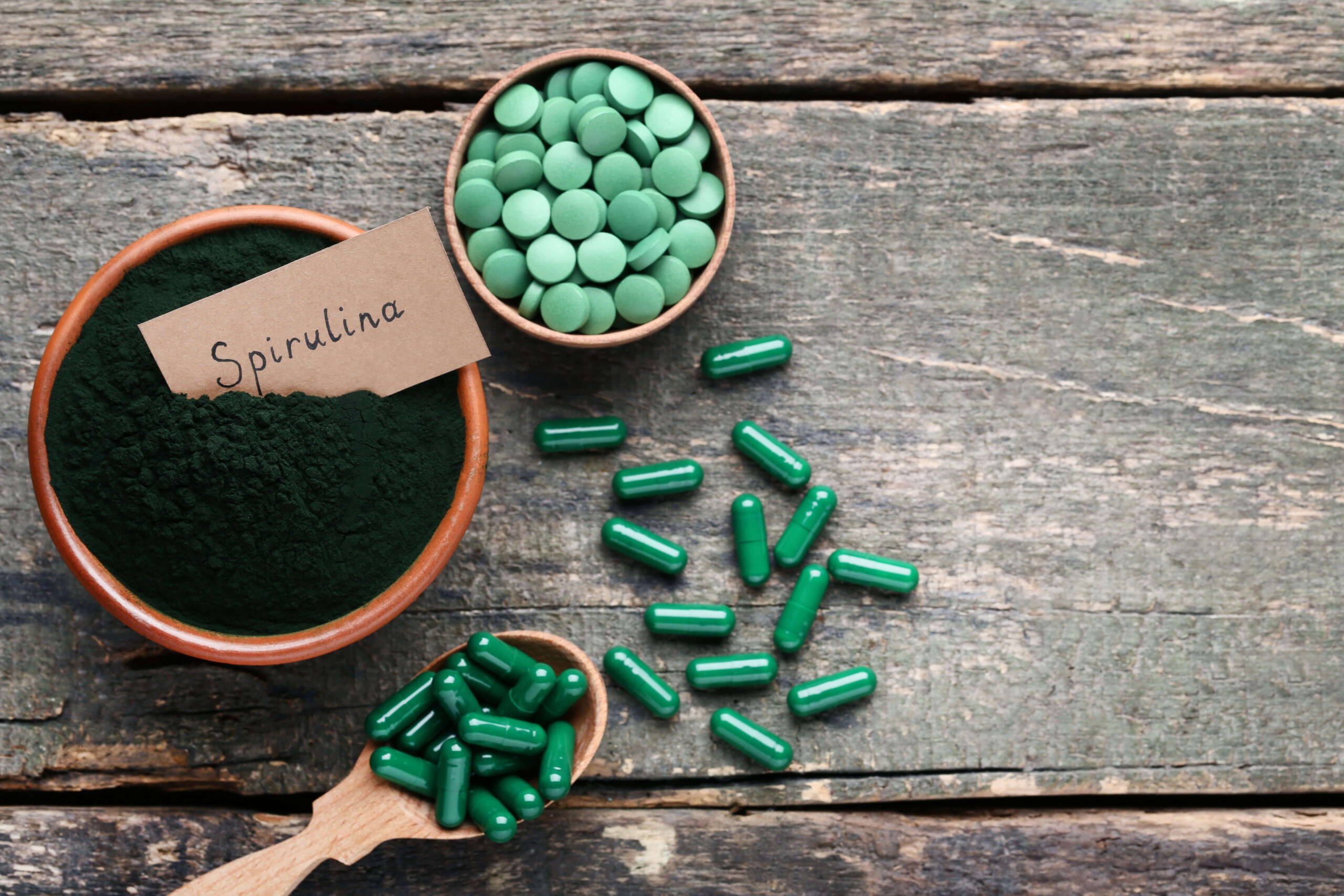
What is Spirulina?
Spirulina is a type of algae associated with many health benefits, thanks to its nutrient profile and powerful antioxidant properties.
What are the health benefits of spirulina?
Spirulina is among the world’s most popular supplements. It is loaded with various nutrients and antioxidants that may benefit your body and brain.
1. Rich in many nutrients
Spirulina is an organism that grows in both fresh and saltwater.
It is a type of cyanobacteria, which is a family of single-celled microbes that are often referred to as blue-green algae.
Just like plants, cyanobacteria can produce energy from sunlight via a process called photosynthesis.
Spirulina was consumed by the ancient Aztecs but became popular again when NASA proposed that it could be grown in space for use by astronauts.
A standard daily dose of spirulina is 1–3 grams (g), but doses of up to 10 g per day have been used effectively.
This tiny alga is packed with nutrients. A single tablespoon, or 7 g, of dried spirulina powder, contains :
- Protein: 4 g
- Thiamin: 14% of the Daily Value (DV)
- Riboflavin: 20% of the DV
- Niacin: 6% of the DV
- Copper: 47% of the DV
- Iron: 11% of the DV
It also contains decent amounts of magnesium, potassium, and manganese.
In addition, the same amount contains only 20 calories and less than 2 g of carbohydrates.
Spirulina also provides a small amount of fat — around 1 g per tbsp. (7 g) — including both omega-6 and omega-3 fatty acids in an approximately 1.5–1.0 ratio.
Plus, the quality of the protein in spirulina is considered excellent and provides all of the essential amino acids that your body needs
Note that it is often claimed that spirulina contains vitamin B12, but this is false. It has pseudovitamin B12, which has not been shown to be effective in humans.
Summary:
Spirulina is a type of blue-green algae that grows in both salt and fresh water. It is highly nutritious and a great source of protein, copper, and B vitamins.
2. Boasts powerful antioxidant and anti-inflammatory properties
Oxidative damage can harm your cells and can drive chronic inflammation, which contributes to cancer and other diseases.
Spirulina is a fantastic source of antioxidants, which can protect against oxidative damage.
Its main active component is called phycocyanin, which is an antioxidant that also gives spirulina its unique blue-green colour.
Phycocyanin can fight free radicals and block the production of molecules that promote inflammation, providing impressive antioxidant and anti-inflammatory effects.
3. May lower cholesterol and triglyceride levels
Heart disease is the world’s leading cause of death.
Many risk factors are linked to an increased risk of heart disease.
As it turns out, spirulina positively impacts many of these factors. For example, it can lower total cholesterol, LDL (bad) cholesterol, and triglycerides, while also increasing HDL (good) cholesterol.
According to one review, spirulina was able to significantly improve these markers in people with metabolic syndrome and related disorders.
Another 2014 study in people with high cholesterol determined that 1 g of spirulina per day lowered triglycerides by 16.3% and decreased LDL cholesterol by 10.1%.
4. Protects LDL cholesterol from oxidation
Fatty structures in your body are susceptible to oxidative damage. This is known as lipid peroxidation, a key driver of many serious diseases.
For example, one of the key steps in the development of heart disease is the oxidation of LDL cholesterol.
Interestingly, several studies have found that the antioxidants in spirulina may be particularly effective at reducing lipid peroxidation.
In fact, one small study showed that spirulina supplementation was able to reduce exercise-induced lipid peroxidation, inflammation, and muscle damage in 17 rugby players.
5. May have anti-cancer properties
While more studies are needed, some evidence suggests that spirulina has anti-cancer properties.
Research in animals indicates that it can reduce cancer occurrence and tumour size.
Spirulina’s effects on oral cancer — or cancer of the mouth — have been particularly well studied.
In fact, several studies have found that spirulina supplementation can be useful for the management of oral submucous fibrosis (OSMF), a type of precancerous lesion in the mouth.
In another 2013 study of 40 individuals with OSMF lesions, 1 g of spirulina per day led to greater improvement in OSMF symptoms than pentoxifylline, a medication used to promote blood flow.
6. May reduce blood pressure
High blood pressure is a main driver of many serious conditions, including heart attack, stroke, and chronic kidney disease.
One review of five studies found that taking 1-8 g of spirulina per day could significantly reduce both systolic and diastolic blood pressure, especially for people with high blood pressure levels.
This reduction is thought to be driven by increased production of nitric oxide, a signalling molecule that helps your blood vessels relax and dilate.
7. Improves symptoms of allergic rhinitis
Allergic rhinitis is characterized by inflammation in your nasal passageways.
It is triggered by environmental allergens, such as pollen, animal hair, or even wheat dust.
Spirulina is a popular alternative treatment for symptoms of allergic rhinitis, and there is evidence that it can be effective.
For instance, one study found that spirulina was more effective than cetirizine, an antihistamine used to treat allergies, in improving symptoms of allergic rhinitis and decreasing inflammation. However, more research is needed.
8. Could be effective against anaemia
Anaemia is a condition characterized by a reduction in haemoglobin or red blood cells in your blood.
There are many possible causes of anaemia, including nutrient deficiencies, genetic disorders, and chronic inflammation, among others.
Anaemia is fairly common in older adults, leading to prolonged feelings of weakness and fatigue.
In one 2011 study of 40 older people with a history of anaemia, spirulina supplements increased the haemoglobin content of red blood cells and improved immune function.
Some other studies in animals have also found that spirulina could improve haemoglobin levels and ease symptoms of anaemia. However, more high-quality, recent studies on humans are still needed.
9. May improve muscle strength and endurance
Exercise-induced oxidative damage is a major contributor to muscle fatigue.
Certain plant foods have antioxidant properties that can help athletes and people who are physically active individuals minimize this damage.
Spirulina appears beneficial, as some studies pointed to improved muscle strength and endurance.
In one study, spirulina supplementation was able to improve oxygen uptake during an arm cycling exercise, with researchers noting that it could act as an ergogenic aid to enhance athletic performance.
10. Could support blood sugar control
Several animal studies suggest that spirulina could help lower blood sugar levels.
There is also some evidence that spirulina can support healthy blood sugar levels in humans.
According to one review of eight studies, spirulina supplementation in doses ranging from 0.8-8 g daily could significantly reduce fasting blood sugar levels in people with type 2 diabetes.
However, there was no significant effect on blood sugar levels after eating or levels of haemoglobin A1c, which is used to measure long-term blood sugar control. Therefore, more research is needed.
The bottom line
Spirulina is a type of cyanobacteria — often referred to as blue-green algae — that is highly nutritious.
Studies show that it may improve cholesterol and triglyceride levels, suppress oxidation, reduce blood pressure, and lower fasting blood sugar levels.
While more research is needed before any strong claims can be made, spirulina may be one of the few superfoods worthy of the title.
If you want to give this supplement a try, it’s widely available in stores and online
Financial and Business expert having 30+ Years of vast experience in running successful businesses and managing finance.





